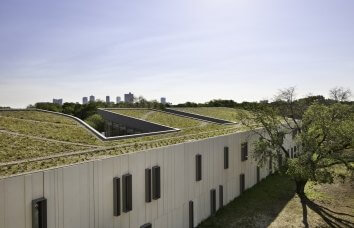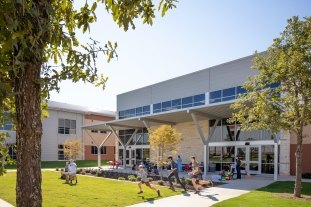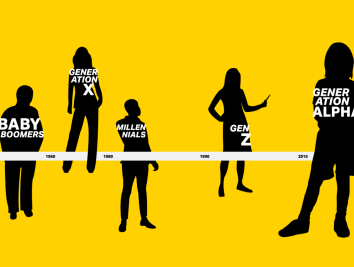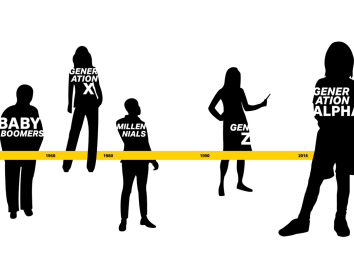Generation Alpha: Your Future Employees (or Coworkers)

“The funny thing about the future, is that it’s already here. It’s just not widely adopted.”
- Matthew Ball, Former Head of Strategy for Amazon Studios
Maybe the keys to the future are here, but they haven’t grown up yet. Generational research is often used in predicting trends relating to the future of consumerism, work, and society. While much has been written on Millennials (1981-1996) and Generation Z (1996-2010), the youngest generational known as Alpha (2010-2025) is only recently beginning to be studied. While they are still children—and still yet to be born—we’re just six years away from the oldest Alphas entering the workforce. And, though predictions about this generation should be written in pencil, their impact on the future of work should not be ignored—and in many ways, is already here.
3 Things to Know about Generation Alpha
1. The Perspective of “Office Work”
Generations prior to Alpha experienced their parents packing a bag and commuting to a place called “work” with the actual tasks themselves remaining a mystery. During the pandemic, Generation Alpha kids suddenly had a front row seat to their parents’ work life in a way that no other generation has experienced. For those parents able to work from home, conference calls, team meetings, and deadlines were conducted within earshot and sometimes within view. Ironically this work was being carried out on many of the same devices used by children to learn, play, and communicate.
64% of Generation Alpha will work in jobs that do not exist today.

Pandemic Shake-Up
For many Generation Alpha kids, the experience of their parents working from home, from vacation, and even from the car are normal. The rise of the side hustle and increase in entrepreneurship continues to impress upon this generation the varying ways in which people can make a living. Some within this generation have begun to work themselves, carving out careers as digital influencers and gamers.
Due to the pace of emerging technology, 64% of Generation Alpha will work in jobs that do not exist today.
The impact of the pandemic shake-up remains to be fully seen, but it’s undeniable most of this generation will expect a level of mobility and autonomy in their work life unlike those before simply because it was on full display during their formative years.
2. Rising Expectations
Generation Alpha holds an expectation of inclusion and rejection of traditional stereotypes.
Messaging around diversity and inclusion is deeply engrained in programming targeting this generation. Disney’s Encanto, a film about a Columbian family’s magical powers, rose to the most watched list for Disney Plus and broke Billboard records with its hit song “We don’t talk about Bruno.” To Disney’s surprise, the breakout star of the movie turned out to be Luisa, the muscular older sister, leaving the other more traditional princess-like sister, Isabella, lacking in merchandise sales. Luisa’s large muscles, sense of familial responsibility and vulnerability in her mental health struggles clearly resonated with this generation, perhaps an indication of the evolution of the female hero.

In one study, participants rated caring for the environment higher than recycling, showing the distinction between large scale goals verses individual behavior.
Also engrained in this generation is a deep sense of social responsibility and empowerment.
67% of 6-9-year-olds say they want to have a career that helps them save the planet.
This generation will expect organizations to play an active role as responsible global leaders. Fighting climate change, enabling sustainable business practices, and more become fair game in evaluating corporate reputations for these future recruits.

Enter outdoor corporate spaces for collaboration, connection, and culture.

In school, subjects involving the outdoors and physical activity surpassed previous favorites of computer and coding classes, with some suggesting an overuse of technology in learning and play have created screen fatigue.
3. Blurring the Digital and Physical Lines
Generation Alpha has been described as digital natives, but make no mistake, native does not mean exclusive. While Gen Z infamously prioritizes technology as a means for connection, Generation Alpha prefers to split time between the digital and physical, connecting with their friends virtually and playing outside in relatively equal amounts.
In a survey of over 19,000 participants 75% said they enjoyed the physical experience of going to a store.
The definition of being together is quickly evolving for this generation. They are creating a virtual world for themselves…Will technology be the primary means of connection or will screen fatigue and a desire for in person connection weigh out?
Looking Ahead
The definition of being together is quickly evolving for this generation. They are creating a virtual world for themselves on platforms like Roblox while games focused on creativity and building, such as Minecraft have also exponentially grown in popularity over those focused on competition or containing violence. Only time will tell how this generations relationship with technology will continue to evolve. Will technology be the primary means of connection or will screen fatigue and a desire for in person connection weigh out?
From a fundamentally different relationship with technology and expectation of what work looks like, the generation has quite the potential to shake things up. It’s important to continue to study their evolution as the pressures of growing up begin, as they tackle the world through their developmental years, and as they navigate our exponentially faster changes in technology, our planet, and our lifestyles.







